 Leading Blog | Posts by Month |
 Leading Blog | Posts by Month |
09.30.12

LeadershipNow 140: September 2012 Compilation
Posted by Michael McKinney at 12:33 AM
09.26.12

You According to Them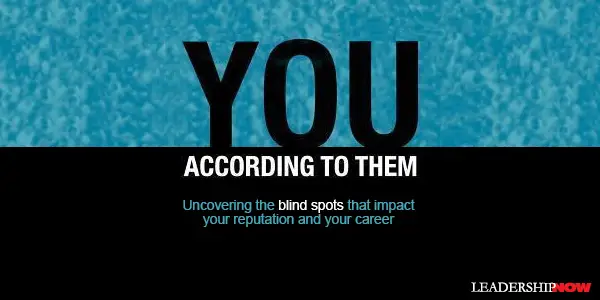 SARA CANADAY addresses a vital issue for leaders in You According to Them: self-awareness. While it is fundamental to our growth, we usually don’t make the time to explore it. And too frequently, we dismiss feedback or make excuses for the insights we receive into our own behavior.
SARA CANADAY addresses a vital issue for leaders in You According to Them: self-awareness. While it is fundamental to our growth, we usually don’t make the time to explore it. And too frequently, we dismiss feedback or make excuses for the insights we receive into our own behavior.
How we are perceived matters more to our leadership effectiveness than our intentions. We must not only seek out how we are perceived by others but we must do something with the feedback we get. Canaday calls this applied self-awareness. In other words, using that information to adjust our behavior and close the gaps between our intentions and how others perceive us. Typically, our blind spots, our perception gaps exist in those areas where we have overemphasized our strengths. “For instance,” writes Canaday, “do your colleagues think of you as assertive? Or overbearing? Collaborative or manipulative? Gregarious or obnoxious? There’s a fine line between these perceptions, but you can see why the subtle differences can have a huge impact on your career and your future.” Canaday discusses in detail nine common perception gaps and how to begin to deal with them:
Self-awareness flourishes in a person that accepts personal responsibility. Without it, we only seek to justify what we do. We never quite get to dealing with those areas where we mean well but are coming across badly. Whether we like how we are coming across to others or not, it is our reality. It is crucial that we seek out our perception gaps and deal with them if we are to be effective and grow as leaders. “No one is so amazingly self-aware that he or she can clearly see and eliminate every potential perception disconnect before it occurs. Those who are the most successful have just learned how to read the diverse people and situations they encounter and respond appropriately.” You According to Them is a great place to start. Canaday places an emphasis throughout this book on “actively working to understand our reputations and artfully managing the perceptions that directly impact our careers.” 
Posted by Michael McKinney at 06:04 PM
09.24.12

Wisdom from The Leader’s Climb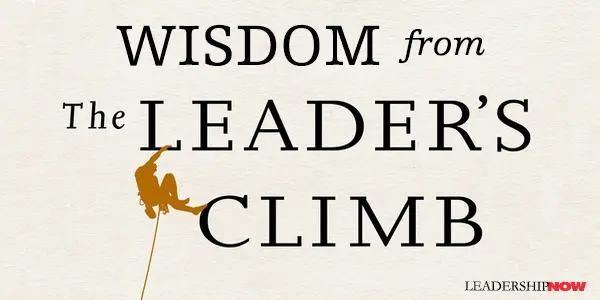 The Leader’s Climb by Bob Parsanko and Paul Heagen is a business fable about learning to counteract the growing pressure to go too fast, fight too much, and force too many decisions.
The Leader’s Climb by Bob Parsanko and Paul Heagen is a business fable about learning to counteract the growing pressure to go too fast, fight too much, and force too many decisions.
There is an alternative to this pressure we all feel. Throughout the story—an exercise in itself to create space, slow down and become more aware—the author’s stress three qualities to strengthen your leadership: Awareness (slowing down), Acceptance (embracing reality), and Abundance (considering multiple options). The Leader’s Climb is well written and nearly everyone will recognize patterns of behavior found in the story’s main character Adam, in themselves. The authors provide a lot to think over. Here are some excerpts: It’s not hard to see the impact on organizations of leadership that focuses primarily on speed, efficiency, results, and financial return. The same issues come up over and over again. The tyranny of the urgent becomes a substitute for planning and prioritization. Snap decisions with hidden costs replace careful consideration with obvious time requirements. Mindless compliance replaces community and commitment. Activity that looks like momentum disguises chaos. Purpose is sacrificed to performance at any cost. 
Posted by Michael McKinney at 10:34 PM
09.12.12

The Strategy Book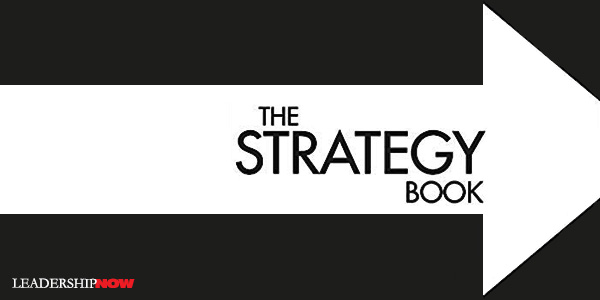
“Strategy is about shaping the future,” writes Max McKeown. There are five basic questions that strategy tries to answer: Where are we? Where do we want to go? What changes have to be made? How should changes be made? How shall we measure progress? There are a number of ways to get the answers to these questions. Max McKeown has created a strategy reference work – The Strategy Book – to guide you to the answers. Each chapter defines the objective, the context and the challenge—and then what success looks like and the pitfalls you might encounter. Well thought out and helpful. Part of thinking like a strategist is learning to recognize unplanned opportunities and reacting. In fact, says McKeown, unplanned opportunities may be your best chance of creating a great strategy. The problem is following a plan so closely without responding to events that you will “lead the company efficiently in the wrong direction.” In a sense, strategy creates risk. “Strategy involves completion of goals, and the risk is the difference between those goals and the ability of the organization to achieve them.” Because “uncertainty can only be reduced by committed decisions and actions,” you can choose to create a “certainty of purpose and direction.” The Strategy Toolkit at the end of the book is not just another nice add-on. It is worth as much as the rest of the book. It contains concise explanations (without all the jargon) of some of the most popular strategy tools and how to use them. In his own words: “First, there are the most popular tools—those that are used most often in the workplace. Second, there are some of the most influential tools from the field of strategy and management. Third, there are tools that I have found valuable in my work with some of the most successful organisations in the world." The tools include: SWOT analysis, Porter's 5 forces of competition, McKinsey's 7-S framework, BCG’s product portfolio matrix, Kim and Mauborgne's blue ocean, Kaplan and Norton's balanced scorecard, Mintzberg’s deliberate and emergent, Prahalad's bottom of the pyramid and twenty-one more. 
Posted by Michael McKinney at 10:20 PM
09.11.12

Leading Views: Gathering Feedback that Drives Growth People need feedback to grow. In Help Them Grow or Watch Them Go authors Beverly Kaye and Julie Winkle Giulioni share a good method for gathering feedback that drives growth: People need feedback to grow. In Help Them Grow or Watch Them Go authors Beverly Kaye and Julie Winkle Giulioni share a good method for gathering feedback that drives growth:
Encourage employees to gather feedback from others before sharing your own. It’s not about politeness but about power. You’ve got it and, as a result, your perspective may carry undue weight. When employees come to you with a plate full of feedback from others, they are better able to put your perspective into perspective. Many people have not had the benefit of learning how to solicit and accept feedback graciously. Since the act of opening one’s self up to the opinions of others can be challenging, the agenda for such a discussion should be simple—as straightforward as ABC. Encourage employees to focus on just three things as they gather feedback from others: abilities, blind spots, and conditions. Abilities: • What are my greatest strengths? • What can you always count on me to do? Blind Spots: • What behaviors have you observed that might get in my way? • How might my strengths work against me? Conditions: • In what settings or under what circumstances do I make the greatest contributions? • Under what conditions have you seen me struggling? • What factors have you noticed trigger stress or other negative reactions for me?
Posted by Michael McKinney at 03:23 PM
09.10.12

Help Them Grow or Watch Them Go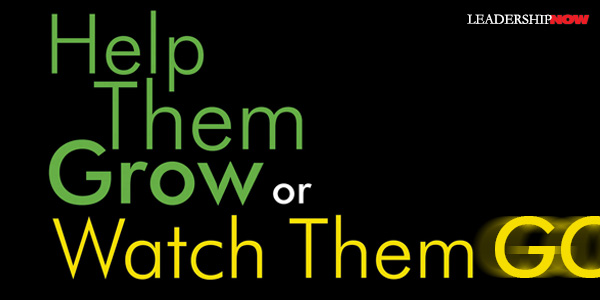
FINDING good employees is not enough. Organizations must have a plan in place to keep the employees they have. A priority for many employees today is career development opportunities. The problem is very few managers and leaders feel they have the time to work on career development. Yet career development, say Beverly Kaye and Julie Winkle Giulioni in Help Them Grow or Watch Them Go, is nothing more than helping people grow. And that’s job one for leaders. Kaye and Giulioni contend that it is not as hard as we usually make it out to be. “Quality career development boils down to quality conversations”—frequent, short conversations that occur within the natural flow of work. They suggest that we “reframe career development in such a way that responsibility rests squarely with the employee and that our role is more about prompting, guiding, reflecting, exploring ideas, activating enthusiasm, and driving action.” Their framework for career development is organized around three types of conversations: Hindsight conversations. These conversations are meant to help develop self-awareness—where they have been and what they are good at. This is even more apparent with by good feedback. “Helping people look back and inward also provides a reservoir of information that allows employees to move forward and toward their career goals in intentional ways that will produce satisfying results.” Foresight conversations. What an employee learns about themselves in hindsight needs to be applied in the context of what is going on around them. “When you help your employees develop the ability to scan the environment, anticipate trends, and spot opportunities, you provide a constructive context for career development.” Insight conversations. These conversations leverage what your employee learns from the convergence of the insight and foresight conversations. Here you guide them into practical steps they can take to be where they want to be. “Onward and upward has been replaced by forward and toward.” Today, it’s not about moving up the ladder but moving to the place you want to be. Kaye and Giulioni suggest that we learn to help them grow in place. This requires a shift in thinking. “The challenge of growing in place involves stripping titles from our thinking and instead focusing on what the employee needs to experience, know, learn, and be able to do.” Too frequently, we limit the scope of career conversations, thinking they’re only about jobs, promotions, or stretch assignments—the actions employees can take to move forward. Important? Yes. But that’s just a drop in the bucket of conversations you can have with employees. We have conversations about the work anyway, so why not make it a teachable moment? “A few minutes of conversation can help others slow down enough to reflect, bring deep insights to the surface, verbalize important messages, and consider how to leverage their expanding skills and knowledge base.” If you don’t think you have the time to incorporate this vital task in what you do, this book is for you. Kaye and Giulioni offer templates, guidelines, and sample conversations and questions that you can adapt to your own situation. With their approach, career development stays fresh because each employee’s career plan is unique and done in real-time.

Posted by Michael McKinney at 10:31 PM
09.07.12

Adaptability: The Art of Winning In An Age of Uncertainty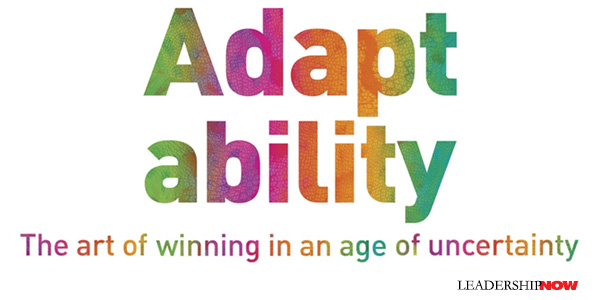
MAX MCKEOWN accurately argues in Unshrink that our beliefs have shrunk us. They have limited our responses. And it profoundly affects our ability to adapt. Adaptability is a book about how people adapt. It is about how to win more often. “In the future,” writes author Max McKeown, “you can try to maintain what you already have, or you can attempt to transcend the constraints of your situation.”Of course, to begin, you have to recognize the need to adapt. That’s not always as easy as it sounds mainly because we have to admit that something isn’t right. You have to understand what’s going on. Enthusiastic ignorance often rules the day. And so as, McKeown points out, “stupid survives until smart succeeds.” Knowing the rules and when to break them is essential to successful adaptability. If you find a system failing, then you have also found a system that is failing to adapt. You need to discover, first, what adaptations are needed for the system to succeed. Second, you should understand what has stopped the system from adapting successfully. And third, you should find out how to free the people in the system to make the necessary adaptations. Once you recognize the need to adapt, you need to understand what adaptation is required. In times of great uncertainty, we need the knowledge creators, the radical and the rebels. “When times are easy, almost anyone can look effective….When choices seem obvious, unimaginative leaders may be rewarded for making the obvious choices even when they know they’re the wrong choices.” Leaders too, need to release its stranglehold on what is considered acceptable and unacceptable thought. Effective adaptation will not happen when there is a dominance of a couple of people over the way everyone else is allowed to think and act. It is important to not only identify what needs to be done, but to keep on learning until you get it right. Something to think about: Most people lock on to a particular course of action, they make their minds up early and fail to adapt to evidence that their choices are wrong. As a result, only a small portion of most people’s experiences lead to new learning. Finally, you need to actually make the changes necessary to adapt. “The most successfully adaptive companies are those that never grow up.” It is rare to find leaders that are comfortable with “learning what is necessary from the people who do the work and know the answers.” McKeown rightly observes that being all knowing is not a human quality. When attempting to adapt, “it is very tempting to try to remake a new situation to match an old situation.” We tend to continue to do what we already know. “In adaptive terms, if you are still in the game, then it’s always the beginning.” This is a critical mindset for successful adaptation. “You can imaginatively rethink your actions so that wherever you are becomes the best place to start.”

Posted by Michael McKinney at 09:29 AM
09.01.12

First Look: Leadership Books for September 2012Here's a look at some of the best leadership books to be released in September.




For bulk orders call 1-800-423-8273  Build your leadership library with these specials on over 120 titles. All titles are at least 40% off the list price and are available only in limited quantities.
Posted by Michael McKinney at 10:24 PM
|
BUILD YOUR KNOWLEDGE


How to Do Your Start-Up Right STRAIGHT TALK FOR START-UPS 
Grow Your Leadership Skills NEW AND UPCOMING LEADERSHIP BOOKS 
Leadership Minute BITE-SIZE CONCEPTS YOU CAN CHEW ON 
Classic Leadership Books BOOKS TO READ BEFORE YOU LEAD |
|